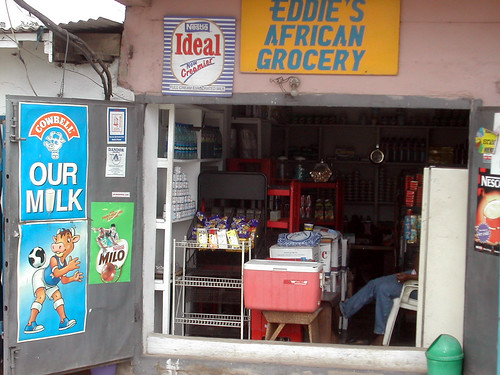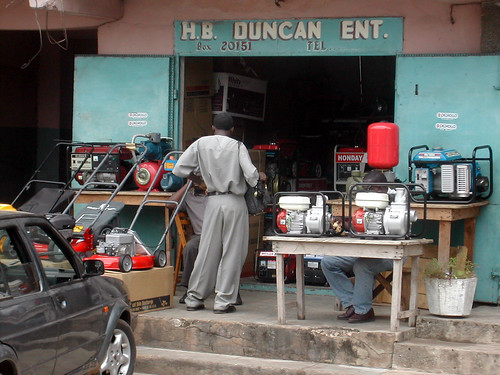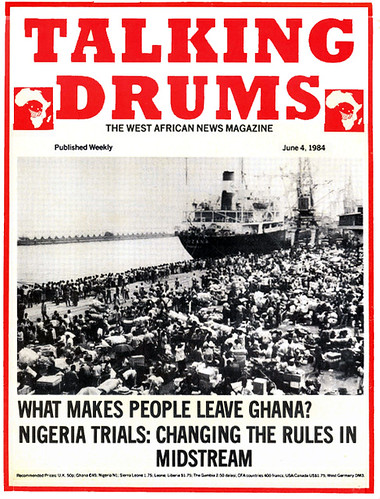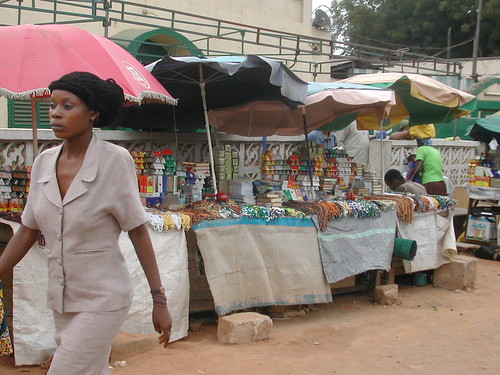Patterns of Exchange
A few weeks ago, a Liberian man passing through Accra, Ghana for a few days on his way to a medical conference in Nairobi, Kenya started feeling unwell and feverish. He called the WHO in Nairobi and informed them he wasn't well, suspecting Ebola. The WHO contact in Nairobi called my aunt, a doctor who works for the WHO in Ghana. My aunt hastily organized an Ebola response team and ambulance and dispatched it to the hotel where he was staying. The doctors and ambulance arrived at the hotel equipped with masks, hazmat suits and protective equipment only to discover that the man had gone to the mall! The doctors then managed to contact him at the mall and eventually conveyed him to the isolation unit at the hospital where he was tested for Ebola. The tests eventually come back negative but he remained in quarantine for the full 21 days until the all clear was given.
This, of course, was the height of irresponsibility. The man clearly knew enough given his symptoms to seek medical advice and to contact the WHO in a different country. But I can't believe that he then decided to leave his hotel room to go to a shopping mall. Ghana certainly dodged a bullet, we are lucky that he didn't have Ebola. Indeed given the traffic between Liberia and Ghana, we have been lucky that Ebola hasn't made its way to the country yet. Based on air traffic patterns, Ghana has been modeled as the most likely country to experience Ebola importation. We have seen the effect of a single infection in the most developed countries, and the contrast in countries with poor public health infrastructure.
My aunt had just returned from a harrowing five week tour of duty helping run the WHO Ebola response in Liberia. The thing she emphasized most about her experience was just how easy it was to inadvertently get infected. The example she cites was someone simply dropping something at the end of the 19th of the 20 steps one has to go through when removing one's protective equipment and bending down to pick it up, thereby getting infected. The Spanish nurse who caught Ebola while attending to two Ebola patients in Madrid believes she might have inadvertently touched her face while disposing of an infected glove.
Upon her return to Ghana from Liberia, the WHO wanted to send her to manage the separate outbreak of Ebola in Congo. She demurred, deciding instead to help set up the UN regional Ebola response center in Accra. I wonder, however, whether she will also decline to go to Uganda to deal with the recent outbreak of the Marburg virus there if asked. Everyone in the family is hoping she stays in Ghana, we certainly need her expertise dealing with the ongoing cholera epidemic that has been plaguing our country.
II. Borders and Boundaries
Item: Thomas Eric Duncan (the Liberian man who died of Ebola in Texas) was a refugee in a camp in Danane in Cote d'Ivoire for a few years after the start of the Liberian civil war launched by Charles Taylor.
One of the success stories so far about the present crisis has been the prevention of the spread of Ebola from Liberia and Guinea to neighboring Côte d'Ivoire. The obvious response is that the borders between the countries were eventually closed. It is worth asking however why there was no transmission before the border closures and, well, there is a political angle to explore.
Nimba county in Liberia used to be a source of mercenaries employed by disaffected supporters of the deposed (and disgraced) ex-President Laurent Gbagbo to destabilize Côte d'Ivoire. In the aftermath of the Liberian civil war, there were lots of ex-combatants searching for employment and, for some, the way of the gun was a lucrative comfort. Ivorian president, Alassane Ouattara, had no tolerance for such things: instability is bad for business and Ivory Coast is all about business. He cracked down with a carrot (tempting the opposition back into the political process - and declining to prosecute most of their misdeeds), and the stick (the Liberia-Côte d'Ivoire border is now one of the most impregnable borders in West Africa). Even before the Ebola outbreak, the effect of this policy on cross-border interchange (and trade) has been severe. One wonders when normalcy will return.
Item: Thomas Eric Duncan would later migrate to Ghana where refugee life was more congenial (and the language and cultural barriers less pronounced). The photos of him that were used by the media, showing him dressed in green attire, were taken at a wedding he attended in Ghana a few years ago.
The Buduburam Refugee Settlement in Ghana was set up to host Liberian refugees in 1990. It was always intended to be a temporary camp but events had a way of imposing permanence and it quickly grew into a sprawling city. The Liberian civil war officially came to an end in 2003 after a few false starts, especially the chimera 1997 elections 'won' at the barrel of a gun by Charles Taylor (campaign slogan: "He killed my ma, he killed my pa, I'll vote for him"). The UNHCR began winding down operations there in 2007 although many NGOs of all stripes continue to advocate for camp residents. Authorities in Ghana have never been keen about the camp and throughout its existence have repeated calls to shut it down. Popular prejudices in Ghana attribute a lot of the rising urban crime to Liberians (and the perennial scapegoated Nigerians). Many Liberians have indeed returned to rebuild their country but the ties they forged in Ghana have endured.
While Ghanaians were refugees in the rest of Africa in the 1980s (after all that is where the notion of Ghana must go came from), there has been relative stability since, and Ghana became a destination for political and economic refugees (for Liberians and Sierra Leoneans throughout their civil wars, for Ivoriens during their conflicts in 2002, 2005 and contested elections, and even for Sudanese in 2005, for the Togolese in a couple of spasms after Eyadema's demise and subsequent elections, for Nigerians whenever their economy has sputtered). By and large, we have opened our doors during crises perhaps because we aren't that far removed from crisis.
I read somewhere (UNHCR perhaps?) that the average length of stay in a refugee camp was 18 years. I couldn't quite bring myself to believe this statistic - that's basically a whole generation. I thought that if the figure was accurate, it only meant that the never-ending Palestinian experience was skewing the numbers of these protracted situations. But then I considered my own family experience, and remembered that it was 18 years after we fled Ghana's 1982 coup regime that my mother returned to live there. Of course our exile in France and England wasn't anything like a refugee camp but the point remains that upheaval can have generational effects. I have now, after all, spent most of my life outside Ghana. Collateral damage as cultural exchange, I suppose.
III. Markets are conversations
The World Bank periodically publishes studies about regional integration, (see De-fragmenting Africa as an example). As befits a bank, it is mostly concerned about "removing barriers to trade". The point is well taken and many studies now focus on transportation. Working roads and railways would indeed be good things; these days infrastructure development is all the rage (sidenote: some of us remember donor nations telling us in the 1980s and 1990s that our economies could not sustain even dual carriage motorways). Of course more and better roads are not the only obstacles to overcome.
Surface transport in West Africa is very expensive compared with the rest of Africa and the developing world. The causes are cartelization and restrictive regulation of the trucking industry. High freight charges do not reflect high transport costs so much as high trucking profits that can be traced to the lack of competition in the industry. Trucking industry profit margins in West Africa were found to be on the order of 80 percent, compared with 20–60 percent in southern Africa.
Surface transport in West Africa is also very slow compared with the rest of Africa and the developing world, because of frequent delays associated with administrative processes.
- Ecowas’s Infrastructure a regional perspective
In 2003, one of my cousins started a factory in Accra processing kaolin (soft white clay), wholesaling for the multinationals like Unilever. I had thought in the years since that he would try to go upmarket and add higher value processing so that he wasn't merely selling raw material. He certainly has maker aptitude (a chemical engineer by training) and I've seen some of the ingenious centrifuges he and his partners have designed for use in the factory. Still, working without the precision machinery that German engineering easily affords, he has added new products to the initial portfolio: calcium carbonate from oyster shells, gypsum for fertilizers and so forth. One can see a path of incremental growth on this foundation. Government industrial policy is supposed to foster such development.
Somehow instead, he has made it into the trucking industry and now supplies heavy duty trucks and mining equipment, a sideangle that has become very lucrative. There is a gold rush again in Ghana (the former Gold Coast) with lots of Chinese and Indian prospectors competing with the local Galamsey (there's also a current scramble for offshore oil with Cote d'Ivoire gearing up to join Ghana's recent operations). There is perhaps a precedent here, not necessarily in the scramble for Black Gold, but rather in the move to transportation from an initial focus on trade. A lot of the big Nigerian trading family fortunes were consolidated in the last century by moves into the trucking industry. They initially started as pure traders (mostly agricultural) but then quickly found that it was more lucrative to be in the trucking business. Margins of 80 percent are nothing to sneeze at in any economic venture. Thus there are huge incentives to prevent things like rail and better highways that all agree are key to increased regional integration.
Beyond the petty corruption that keeps things stuck at the border (informal payments and delays), there is also Big Money that adds inertia to tariff policy and regulatory processes. This is the additional context (whose parochial concerns are hurt by increased regional integration) that is missing when you read through the admittedly interesting research notes such as Removing Barriers to Trade between Ghana and Nigeria.
Both countries account for about 61 percent of population and 68 percent of GDP in ECOWAS...
Beyond trade, substantial migration flows between both countries have existed for a long time. Recent estimates put the number of Ghanaian emigrants in Nigeria at 125,000 (IOM 2009), which represent 13 percent of Ghanaians living outside Ghana, and the number of Nigerians living in Ghana at more than 50,000...
Ghanaian manufacturers believe the key barriers to increasing trade with Nigeria include substantial informal payments and delays — regardless of whether documentation is complete — transit charges, and requirements for product registration...
The [ECOWAS] protocols also establish the right of citizens with a valid travel document and health certificate to stay for up to 90 days in another ECOWAS member state before being formally required to apply for residency... Such application should be automatically granted. The revised ECOWAS treaty of 1993... stipulates that ECOWAS citizens should be treated identically to national citizens in establishing and running a business.
- Removing Barriers to Trade between Ghana and Nigeria Strengthening Regional Integration by Implementing ECOWAS Commitments
There is a notional vision of open borders, common currencies and even political union embodied in Ecowas and in the wider African Union. In general, the Francophone countries in ECOWAS have been more integrated but even they have been subject to things falling apart periodically. Ghana and Nigeria have historical ties and ought to have every incentive to strengthen them. The concern is that there are many regional integration processes that are currently being disrupted by the Ebola outbreak. Let's hope that the cultural ties are resilient enough to survive the challenge and quickly rebuild.
West Africa is the part of Africa with the strongest market traditions. I'd argue that the accompanying social engagement is what Africans have to teach the rest of the world and that conversational banter is often lost in the modern world. Trade and markets are not the only lens through which to view patterns of exchange.
Item: when a BBC journalist asked a Sierra Leonean how he prepared for the three-day nationwide Ebola lockdown that took place in September. The reply was "I have bought enough credit on my mobile phone".
Social living is the best.
Soundtrack for this note
- Burning Spear - I & I Survive
I've been vibing to Burning Spear concerts of late . I now place his run from the mid 1970s to say 1985 among the great musical feats I've witnessed. - Dianne Reeves - Body And Soul
I prefer the version she recorded on the aptly named Art And Survival album.





